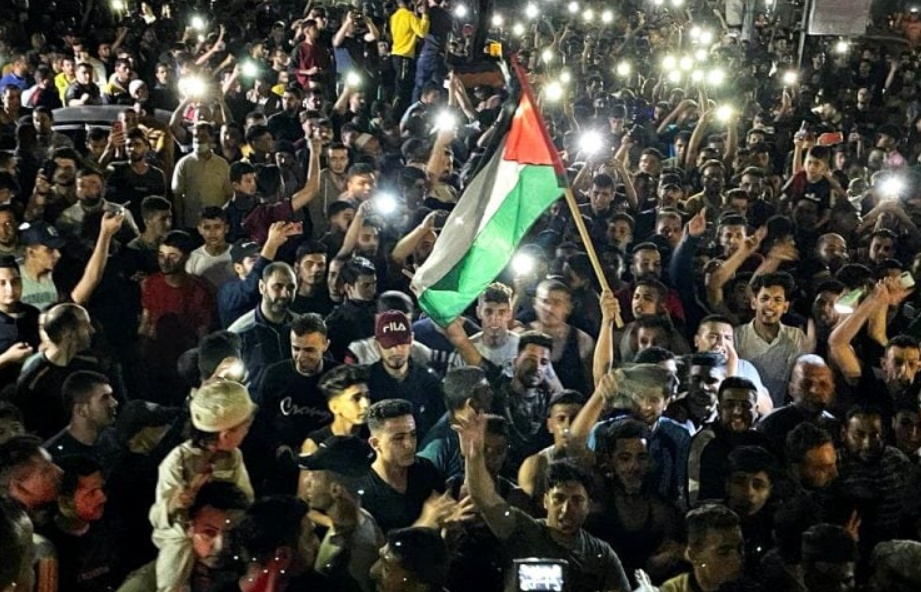By: Saurav Sarkar
Israeli flags are flying over all government buildings in the United Kingdom currently, but this isn’t the first time the former imperial hegemon has put its weight behind Zionism. In 1917, the British government issued the infamous Balfour Declaration.
This brief document—67 words—was a turning point in modern Palestinian history. It committed Great Britain to establishing a “national home” for Jewish people in Palestine. (The initial language promised a “Jewish state,” but was changed later.) The Balfour Declaration contained language that was meant to safeguard Palestinians, but we have seen how that has played out in the ensuing century.
From World War I to 1948, the British ruled Palestine, the bulk of that time under a mandate issued by the League of Nations. The population of Jewish settlers in Palestine increased over these decades—particularly the 1930s—as the British government fostered their immigration. In 1922, only 11 percent of the population in the region was Jewish. By 1931, the figure was up to about 17 percent. By 1939, it was almost 30 percent.
At that point, the British government sought to limit any further expansion of the Jewish population in order to ensure stability in the region. But by then, it was too late—the facts on the ground had changed. What had been a region that was almost 90 percent Palestinian had become a contested land between two demographically numerous groups. Moreover, the British had confiscated land from Palestinians to hand it over to Jewish people and engaged in violent repression of incipient Palestinian nationalism. And in the 1930s, a British government commission recommended that Palestine be partitioned, laying the groundwork for the failed “two-state solution.”
In other words, this conflict is the product of specific imperial policies that were practiced in the first half of the 20th century to foster a colonial project. The “Jewish question”—Europe’s longstanding inability to adequately address its own antisemitism—was made into Palestinians’ Zionist problem by the British Empire.
One of the key features of British rule was to play different groups against each other. One of the key methods adopted by them over the course of centuries and a global collection of provinces was to study the social history of their subjects to manage the politics and play different groups against each other.
The support for Jewish migration to Palestine triggered resentment and mobilization by Indigenous Palestinians, eventually leading to the Great Revolt of 1936-1939. The revolt, which included a general strike and peasant uprising, was violently repressed by the British government in collaboration with Zionist paramilitaries. However, after the revolt, the British began to limit further Jewish immigration to the region, turning against the group they had supported in order to protect their imperial interests. This led to violent attacks by Zionists in Palestine.
Palestine is not alone in this fate. In region after region, the British used strategies of “divide and rule” to pit one people against another for the benefit of the empire. In British India, they pushed the Hindu-Muslim divide, sometimes favoring one population, sometimes the other. In Cyprus, they pitted the Greeks against the Turks. In Sri Lanka, it was the Tamils against the Sinhalese. In Ireland, it was the Catholics against the Protestants. The list goes on.
In all of these places, the supposedly “ancient” politics of intergroup conflict have persisted beyond when the sun set on the British Empire. There have been territorial divides based on ethnicity and/or religion. British India became India and Pakistan. Pakistan was then further subdivided into Pakistan and Bangladesh. Ireland was split up into the Republic of Ireland and the UK’s Northern Ireland. Cyprus is divided in two, and its legal status is still unresolved. In Sinhalese-dominated Sri Lanka, a 30-year civil war waged to establish a Tamil state, which ended in 2009 in a similar fashion to what we are witnessing in Gaza today. And in 1948, Palestine was formally partitioned, establishing a Zionist state and what was meant to be a Palestinian one, with the blessing of the former British rulers who oversaw the beginning of the Nakba.
Each of these places has been marked with violent conflict based on “ancient” hatreds that can be traced to the last one or two centuries. It is this commonality that firmly establishes that the British Empire policies are the root cause of the violence in these regions; there are simply too many instances of these conflicts being traced back to the empire to imagine a coincidence.
While the proximate causes of Israeli apartheid, occupation, and genocide clearly lie squarely at the feet of Israel and its chief sponsor the United States, the United Kingdom has a special responsibility to make right its historical sins in Palestine—and everywhere else. A minimal first step would be to work to stop the current genocide instead of waving an Israeli flag. But this—let alone reparations—does not seem to be on the table.
This article was produced by Globetrotter. SauravSarkar is a freelance movement writer, editor, and activist living in Long Island, New York. They have also lived in New York City, New Delhi, London, and Washington, D.C. Follow them on Twitter @sauravthewriter and at sauravsarkar.com.
Source: Globetrotter



